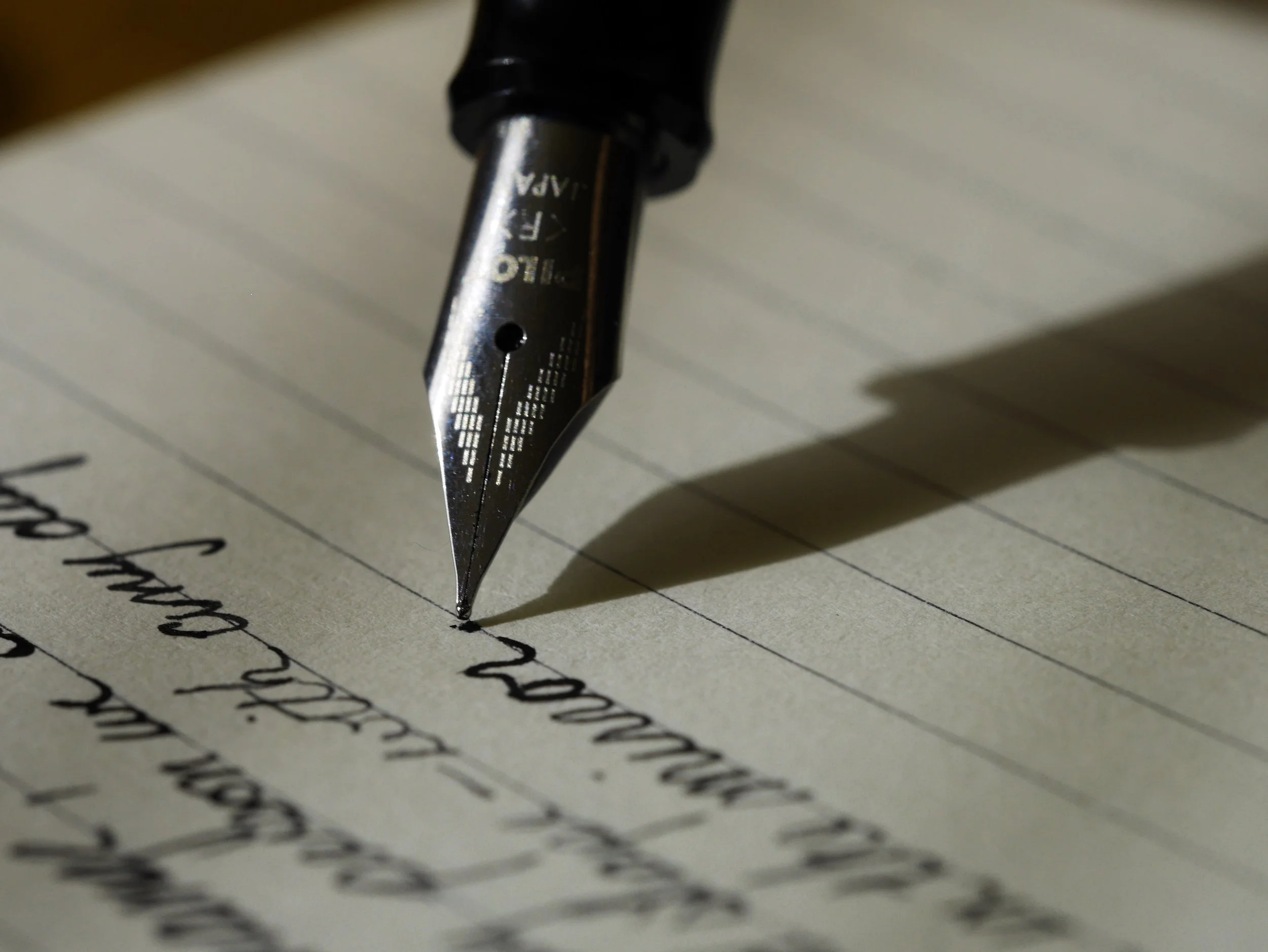Compassionate Craft: Karen’s Blog

Wait. What? Emotions Are Not Feelings?
Feelings can range from nonsensical sounds—“Ouch!”—to deep dives into the physical sensation—“You’re breaking my heart.”— to complex analysis of the layers in the body’s discomfort—“I’m so happy to see everyone but I hate surprise parties, though I’m deeply grateful to have friends who would plan all this for me.”

Exclamation Points!!!!!
A comma says, “Inhale here; more is coming.” A period says, “Exhale, pause, inhale and begin the next sentence.” How is the reader supposed to breathe through an exclamation point? The thing is part period and part a brick wall of a stop. It interrupts the breath like sighting a English Royal Guardsman in full uniform (!) in line at the Dairy Queen.

Worthwhile: Thirty-Five Years of Writing A Novel to Done
What I’d not expected: in writing out my thirty years of imprisoned narrative, I began to revise myself. To write the conflict for my characters, I had to live the analogous conflict. The writing became both liberating and terrifying in the same instant. I wanted not to go through that. Yet, I wanted to see how the story turned out.

Shadow Vocabularies: Writing Swear Words
Our thou shalt not say words make for shadow vocabularies. To speak forbidden words feels a form of magic in the explosion of sudden emotion—curt syllables meant to bite rather than to express. Such words can relieve tension. Such words can hurt.

The Five R’s of Managing the “No, Thank You”
That we even think of the process as “rejection” begs the question why? Why go looking for the harshest, most painful description possible? Having no answers for that, I offer here one way you might roll through a No, thank you.

Publishing: Rumors of Hostile Territory
The touchstone of reassurance reminds us that those who work in publishing have Inner Critics, too. In truth, the men and women I met in my few years in publishing are lovely human beings. They wanted the best for my writing as they wanted the best for their careers. But the publishing industry is run by human beings in the full panorama of what human means. Not everyone is trustworthy or kind. The same is true of writers—also human beings.

Empathy and the Query Letter
One aspect of the query process is rarely talked about: Empathy. Put yourself in the place of the agents or editors you are querying. Imagine yourself on a dating app. You’re not looking for a fling. You’re looking for a strong and steady long-term relationship. You have tens of thousands of possibilities, and every single day brings more.

Finishing My Forever-Unfinished Novel
At a reading by a Famous Author, the audience spied him in the distance where he furiously marked up, in red pen, a copy of his Award-Winning book. The moment galvanized hope. Here a Famous Author revised, again, before he read from his already celebrated success. With that red ink, he provided the answer to the oldest question in writing: When am I done?

Making Progress
That may be because we think of our writing as something to finish as opposed to something we are growing within ourselves, a root system that, as it goes deeper within, also expands its reach without. A growing energy doesn’t stop growing if we are called away from watching for growth. Provide writing with food and water (reading and imagination), and your writing will grow as intended by the inherent sense of what it wants to be.

Procrastination: The Long-Lost Virture
Procrastination is, like every other aspect of writing, a process. This is why writers need so many naps. The process may look as though nothing is getting done, but within? Our enculturated feelings about productivity are throwing rotten vegetables at the Puritan-built stocks in which we’ve placed our creative selves. We feel guilty. We feel failed. If we’re writing to a deadline, we feel stressed. But we weren’t loitering or being lazy. We were waiting for the next right step to present itself.

The Rabbit Holes and Oubliettes of Research
I’m counseled to write what I know. What the hell do I know? This is my white-rabbit worry that lures many a writing project down rabbit holes of research. I chase that magical promise of certainty. These tunnels of intellectual adventure can quickly turn into oubliettes where my intended stories get trapped, destined to be forgotten.

First Draft Blues
That “not good enough” voice kicks in hardest when assessing an innocent first draft. Being ego-driven, the voice has only one opinion: You’ve done me wrong. Ego loves to wail those first draft blues.

In Praise of Half-Filled Notebooks
Our definition of “the world” evolves in a way that requires leaving off the old ways in search of the new. To forget the old, however, is to lose the story of getting here.
That’s why I have so many half-filled notebooks.

The Writer’s Workout
If the writer has hit that place where only the story exists and there is no longer awareness of time or typing or words appearing before their eyes, the muscles grow stiff as the fully engaged writing systems don’t know how to stop until depleted of energy—sometimes in the middle of a sentence.

The Footprints I’ve Left Behind Me
We create for the moment we’re in, a Now imbued with its particular emotions and thoughts. Those will change—most likely in the process of creating an expression for that state of being. This is why we can love our writing one day while the next day not understand where the writing came from, let alone what it means.

Boomerang
The words don’t change. I sit up all night watching the page, and not a single letter shifts. Still, the pleasure taken in my writing of one day returns the next day as snooty disdain. Not a mere, “I can do better,” but a “What the hell were you thinking?” I call it the Boomerang, one day’s careful shaping of language cast out toward the hopeful distance—only to spin right back and smack me in the head.

I Quit Being a Real Writer so I Could Write
My writing swings, a pendulum sweeping between wonder and despair—often in the same paragraph, often in the same reading. One day, I’m gossiping with Muses. The next, I’m searching word mines for veins of grace and finding only F-bombs.

Soup Makers and Bread Bakers
Writers often get reduced to one of two types, “Plotters” or “Pantsers.” George R.R. Martin defines the duality as “Architects” or “Gardeners.” The idea is the same. One type of writer wants their plans fully in place—outlined—before launching into their story; the other dives straight in to discover the potentials and surprises their story may hold. Both are work. There is no such thing as “easy” writing.
Contact Karen
Book a consultation with Karen to discuss your latest project.
